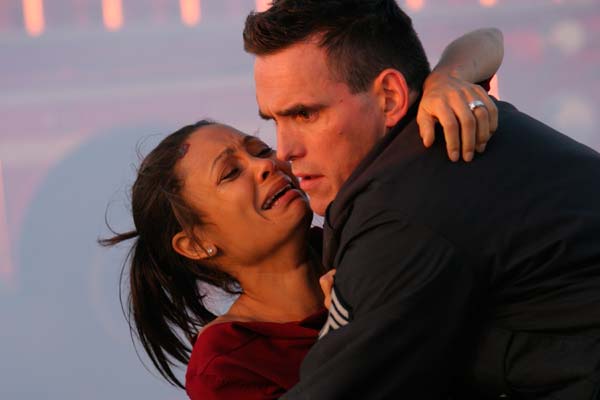If your temple or your mosque or your church was attacked by terrorists, your family was hurt by an act of hate, would you pick up a gun to avenge yourself? Or atleast carry a burden of hate against THEM forever? What if we killed a perceived enemy and realised, a gun shot or a lifetime of hatred later, that those we killed were just like us? What if we realised that faith cannot be a singular thing and that human-beings cannot exist in ghettos? What if we learnt that we represent more than our skin colour, our history, our Gods and our prophets? What if we realised that we all need each other and cannot shut anyone out of the cycle of life?
**
Post the recent acts of terror, these questions flood your mind while watching Crash. The film may not be set in India but its hate-torn Los Angeles could be the Kashmir or Gujarat of today where prejudices guide behaviour and people are judged and killed for their perceived identity than their humanity.
No doubt about it. Crash was a worthy winner of the best film Oscar in 2005. Hands down. And not just because it addresses the universal problems of lack of faith and trust between communities and races and religions and nationalities. It deserved to win also because it takes a self-indicting, unsparing look at the bigotry and prejudices bubbling under the surface of the post 9/11 America. Or perhaps the paranoia was always there and it just took two tumbling buildings to bring it to boil.
**
Crash starring stars Sandra Bullock, Don Cheadle, Matt Dillon, Jennifer Esposito,Michael Peña, Brendan Fraser, Terrence Howard, Chris “Ludacris” Bridges,Thandie Newton, and Ryan Phillippe does not have a linear story. The film is a mass of floating atoms, skeins of various colour threads, seemingly unrelated incidents which all coalesce and show us what the Persian, Hispanic, Black, White, rich and poor characters in the film are really like. Exactly like each other. Watch Matt Dillon’s racist cop trying to save a black woman from a burning car wreck. The same woman he had molested a few nights back. And the way they cling to each other to survive, their anger and hate forgotten in a moment of pure human contact.
**
Or the way a black kid with a crime record laughs at the religious statue he sees in the car of a white cop. “People,’’ he laughs realising in a moment of grand epiphany just how alike people are under their different skin colours. Or the way a black and a white cop watch over their respective ailing parents.
Or the tears an Iranian old man sheds after he has shot a little girl in response to the endless persecution he has suffered for not being a pure-bred American. Prejudice, the film tells us has no colour. There is the DA’s wife (Sandra Bullock) who wants her locks rechanged after they have been fixed by a Hispanic youth covered with tattoos. The man she suspects of being a hoodlum is actually a father trying to protect her five year old daughter from the gun culture of poor neighbourhoods.
**
On the other hand are the young African-Americans with a gnashing hatred against anything white. There are many types of minorities in the film. Blacks who have clawed their way to the top of the heap but still have to compromise with the powers-that-be to stay where they are. Young black men from crime infested neighbourhoods answering inert hate with overt hate. Emigrants who are attacked for being outsiders. And innocent victims of stray acts of violence.As life demonstrates so many times, the film too shows us how one random act, be it of violence or kindness kickstarts a cycle which can either tear people apart or bring them together in a world full of different agendas and languages and races.
This Paul Haggis film is full of rage and kindness, ugliness and beauty, moments of shame and redemption, terror and hope. And it makes us look deep into the dark and blind spots of our minds. What more can a film achieve?
**
This piece appeared in The New Indian Express in 2006







 with
with